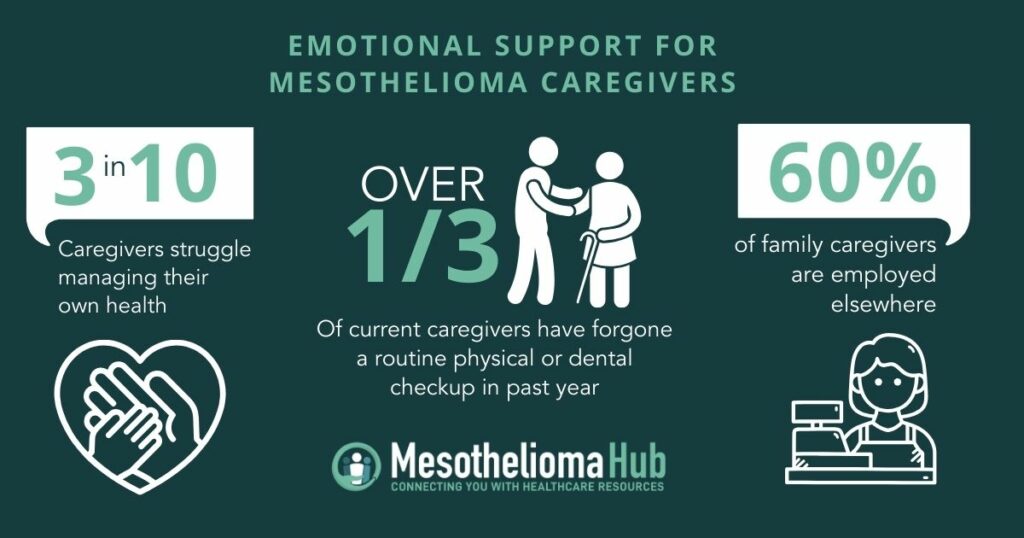
Caregiving can be emotionally rewarding yet challenging, and 40% to 70% of family caregivers may experience symptoms of depression. Learn more about how to access emotional support for mesothelioma caregivers.

Emotional support for caregivers can be hard to come by. When a person is diagnosed with mesothelioma, it is often necessary for them to have someone to care for them beyond just their medical team. A caregiver’s role can include cooking, cleaning, and providing transportation to appointments. Although being a caregiver can be a compassionate act, it can also be challenging. In fact, research shows that 40% to 70% of family caregivers experience symptoms of depression. As a caregiver, taking care of yourself physically and mentally is crucial.
The role of a caregiver extends far beyond the conventional tasks of cooking, cleaning, and transportation. It involves a delicate balance of meeting not only the patient’s physical needs but also tending to personal emotions that accompany them along the journey. Research underscores the complexities, revealing that a substantial percentage of family caregivers grapple with symptoms of depression. To truly support caregivers in this challenging undertaking, there’s a pressing need to acknowledge, address, and fortify the emotional aspects that come with this mentally taxing role. Learn some essential tips for maintaining positive emotional well-being while caring for a mesothelioma patient.
Caregiving for mesothelioma patients involves providing physical and emotional support, which can impact the well-being of caregivers. Witnessing a loved one’s suffering leads to emotional stress, exhaustion, and potential burnout. Financial strain due to medical expenses and potential loss of income adds to these challenges. To manage emotional health while supporting patients, caregivers can:
Caregiving for mesothelioma patients can lead to fatigue, but by prioritizing self-care and seeking support, caregivers can better support their loved ones while safeguarding their own well-being.
Providing psychological support for someone can be emotionally and mentally demanding. Therefore, it is crucial for caregivers to prioritize their mental health and seek coping strategies. Taking care of yourself is just as important as taking care of your loved ones. Caregivers can effectively care for their mental health by engaging in various activities on their own, such as:
Supporting a loved one with mesothelioma often leads to emotional exhaustion and burnout. Witnessing their suffering causes emotional distress, anxiety, and depression. The demanding responsibilities and managing medical needs contribute to this exhaustion, impacting caregivers’ ability to provide effective support. This emotional strain can result in feelings of helplessness, grief, and stress, hindering their caregiving ability. Neglecting their emotional well-being jeopardizes their capacity to offer quality care to the patient.
It’s crucial for caregivers to prioritize their emotional needs. Seeking support through groups, counseling, or therapy is vital. Addressing emotions empowers caregivers to navigate challenges better, reducing burnout risk and enhancing their caregiving abilities. Acknowledging their emotional needs and seeking help sustains caregivers’ capacity to provide compassionate support to mesothelioma patients. Prioritizing their emotional well-being not only ensures their own health but also strengthens their ability to care effectively for their loved ones.
Caregivers supporting mesothelioma patients can improve their resilience and well-being by following essential strategies. Prioritizing physical health through regular exercise, a balanced diet, and ample rest is important for self-care. Emotional self-care through mindfulness and relaxation techniques can also help manage depression and stress effectively. Allocating time for personal hobbies and activities can offer rejuvenation, and setting boundaries by recognizing personal limits and delegating tasks to others can prevent over-commitment and burnout. Seeking peer support through caregiver support groups or professional counseling creates a supportive community to share experiences and manage emotions effectively.
By implementing these strategies, caregivers can cope with the emotional demands of their role. Self-care routines provide crucial breaks, setting boundaries ensures energy preservation and peer support fosters a sense of understanding and belonging. Overall, these approaches empower caregivers to navigate their responsibilities while safeguarding their own well-being.
Caregivers play a crucial role in the care of mesothelioma patients. It’s important to recognize the emotional toll that caregiving can take on both the caregiver and the patient. Therefore, it’s vital to provide emotional support resources for caregivers. Accessing support networks such as counseling and caregiver groups is essential for providing guidance and a community of understanding. By prioritizing their emotional well-being, caregivers become better equipped to navigate their role effectively, which benefits both themselves and the patients. Encouraging caregivers to utilize these resources ensures they have the necessary support to provide compassionate care while maintaining their resilience. Mesothelioma Hub offers support and resources to caregivers of mesothelioma patients.
Madeline works for the patient advocate team and writes about asbestos exposure and mesothelioma. She is passionate about helping families in the mesothelioma community.
Hopkins Medicine. (n.d.). Coping Skills for Caregivers. Retrieved from Hopkins Medicine: https://hopkinsmedicine.org/-/media/about/documents/community-health/called-to-care/coping-skills-for-caregivers.pdf
Mayo Clinic Staff. (2023, August 9). Caregiver stress: Tips for taking care of yourself. Retrieved from Mayo Clinic: https://mayoclinic.org/healthy-lifestyle/stress-management/in-depth/caregiver-stress/art-20044784
Moore A, Bennett B, Taylor-Stokes G, Daumont MJ. Caregivers of patients with malignant pleural mesothelioma: who provides care, what care do they provide and what burden do they experience? Qual Life Res. 2023 Sep;32(9):2587-2599. doi: 10.1007/s11136-023-03410-4. Epub 2023 Apr 25. PMID: 37097405; PMCID: PMC10393857.
Schier-Akamelu, R. (2023, June 13). 2023 Caregiver Burnout and Stress Statistics. Retrieved from A Place for Mom: https://aplaceformom.com/senior-living-data/articles/caregiver-burnout-statistics